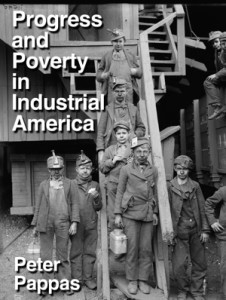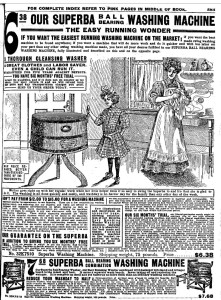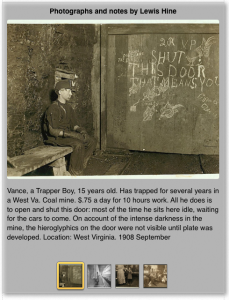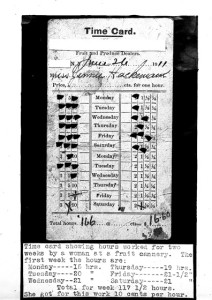My latest multi-touch iBook, Progress and Poverty in Industrial America, is available for your iPad - free / iTunes. It’s a great resource for use in the classroom, and serves as a model for teacher or student curation of historic content into interactive digital DBQ’s. (More of my posts on publishing with iBooks Author.)
This 18-page document-based question guides students through the historian’s process with an investigation of the essential question, “How do we evaluate the social costs and benefits of technological innovations?” To make the question relevant to students, it begins with a brief examination of the impact of 21st c technologies / global economy on progress and poverty in contemporary America.
Next the iBook turns to historic content set in late 19th century America. “Stop and think” prompts encourage a deep reading of many notables of the “Gilded Age” – including Russell Conwell, Henry George, Andrew Carnegie and Stephen Crane. Visual source material includes posters, 1908 Sears Catalogue, a gallery of photographs by Lewis Hine and video of one of Edison’s early Vitascope films. Guiding questions help students think more deeply about each document:
What does the document tell you about America at the turn of the 20th century?
How do these historic themes of “progress and poverty” relate to issues in America today?
How do we evaluate the social costs and benefits of technological innovations?
Students are guided through the historian’s process with a focus on the contrast between historic perspectives.
For example, students can compare how industrialization impacted children in different ways in the stark contrast of a young girl demonstrating the use of Sears Superba Washing Machine (“mother’s little helper finds it easy to swing the Superba to and fro… ”) and a gallery of Lewis Hine’s child labor photographs.
Can the cannery worker really take advantage of the new libraries that Carnegie has so generously donated to the city?
Another document is from records of the NYS Factory Investigating Commission- Time card dated June 26, 1911. “She was employed in a fruit cannery. She worked 166 hours for the two weeks, earning $16.60.” Student can contrast that with an excerpt from Carnegie’s Gospel of Wealth – “the millionaire will be but a trustee for the poor; entrusted [with wealth] … administering it for the community far better than it could have done for itself.”
Critical thinking questions based on Common Core skills are embedded throughout the text and help students “think like a historian.”
- Who created the document?
- What was the creator’s goal?
- How does the document reflect its historic time period?
- How do multiple documents support or contradict one another?
- What historic “voices” are missing from this collection – women, immigrants, minorities, workers?
Finally student are invited to share what they’ve learned in writing and a variety of other products:
- Compose an essay or blog post
- Draw an illustration, create an infogram, post a video
- Role-play a debate – Hine vs Carnegie? or Conwell vs a supporter of the Occupy Movement?
- Start a discussion on Facebook, curate a photo gallery on Flickr, create a new Twitter hashtag
- Research the world around you and leave a document for a future historian






Peter,
Wondering about your take on the changing role of the teacher librarian?
Hi Glen,
Throughout my years as a student and then as a teacher – I always got along great with librarians. I envied them because they knew where all the information was an how to get to it.
The digital revolution has changed all that (I don’t think librarians could every know where all the information is.) We’ve dispersed the information, eliminated the gatekeepers and given rise to a type of literacy which librarians are at the forefront of teaching – how to find information, decode it, critically evaluate it, organize it into digital libraries, be able to share it with others, and maintain a selective focus.
Lots on their plates these days – more challenging the memorizing the Dewey Decimal Classification.
For more on that theme see my post What Happens in Schools When Life Has become an Open-book Test?